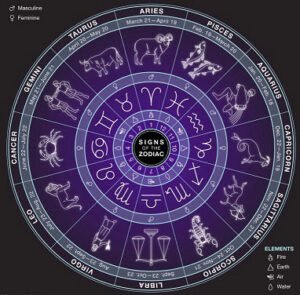Astrology
The term astrology means “knowledge of the stars.” A skilled astrologist views the stars and planets as if they are life forces that are experienced within each of us.
The term zodiac is Greek, and means “animal“. The ancient Greeks improved upon the art of astrology by dividing the heavens into 12 groups known as constellations. Each of these groups is identified with a zodiac character, which in turn, correlates with the personality of each constellation.
The term horoscope a combination of “hour” and “instrument for viewing”. It is termed thusly because thoughout the skies we are able to gain insight (view) our lives. We focus in on this view by determining the activities of the heavens at the hour of our birth. So when we read our daily horoscope, we are seeing a slice of our life in star-form. Essentially, the position of the stars are a reflection of our lives and vice versa.
The sun is viewed as the king of the stars. It takes center stage. Likewise, astrology dictates there is a center within each human that represents the sun. This aspect of your personality is that shining part of your being that is your core, our essence. This core is identified as your ‘sun sign‘. Your sun sign is determined by what time the sun rose upon the moment of your birth. Here, and throughout astrology we see the macrocosm mirroring the microcosm. Meaning, we reflect a bright sun shining brightly within us which mimics the actual sun in our solar system.

The study of the positions and movements of celestial bodies and their supposed influence on human affairs and natural phenomena, has been practiced for centuries by various cultures. While its scientific validity is debated, proponents of astrology often cite several potential benefits:
- Self-awareness: Astrology provides a framework for self-reflection and understanding by analyzing one’s personality traits, strengths, weaknesses, and tendencies based on their astrological sign and birth chart. This can lead to increased self-awareness and personal growth.
- Relationship insights: It is often used to analyze compatibility between individuals, whether in romantic relationships, friendships, or professional partnerships. Understanding astrological compatibility may help individuals navigate and improve their relationships.
- Life guidance: Many people turn to astrology for guidance during important life decisions or transitions. Astrologers may provide insights into career choices, educational pursuits, or major life events based on the alignment of celestial bodies at a given time.
- Predictive insights: Some proponents believe that astrology can offer insights into future events or trends by interpreting celestial alignments and planetary movements. While not scientifically validated, some individuals find comfort or direction in astrological predictions.
- Spiritual connection: For some, astrology is a tool for connecting with a higher spiritual or cosmic realm. By studying the movements of celestial bodies, individuals may feel a deeper connection to the universe and their place within it.
- Cultural and historical significance: Astrology has played a significant role in many cultures throughout history and continues to be an important cultural and historical reference point for understanding human behavior, societal trends, and cultural practices.
- Psychological insights: Astrology can be used as a psychological tool for understanding human behavior and motivations. By examining astrological symbols and archetypes, individuals may gain insights into their subconscious patterns and motivations.
- Community and camaraderie: Believers in astrology often form communities and social networks based on shared interests and beliefs. Engaging with like-minded individuals can provide a sense of belonging and support.
It’s important to note that while astrology may offer benefits to some individuals, its scientific validity is highly disputed, and its interpretations are subjective. Critics argue that any perceived benefits may be due to psychological factors such as confirmation bias or the placebo effect. Ultimately, whether astrology is beneficial or not depends on individual beliefs and experiences.
